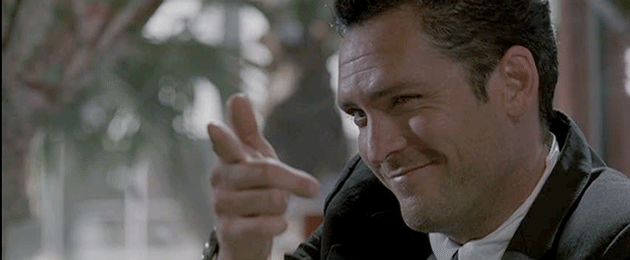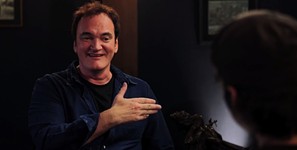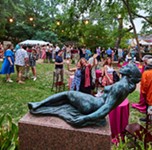Michael Madsen, Last of the Warrior Poets
Mr. Blonde on poetry, hats, and 'Reservoir Dogs'
By Richard Whittaker, 2:29PM, Mon. Dec. 3, 2012

Ask Michael Madsen about the toughest part of filming Reservoir Dogs, and it wasn’t the low budget – he’s used to that. Not the famous ear-slicing scene, improvised in four takes. It may have been getting veteran actor Lawrence Tierney through his big scene, where gangster Joe Cabot gives his jewelry heist crew their nicknames.
Madsen's voice rumbles like a Harley on old black top, his thick silver rings clicking against each other like desert-bleached bones. He may be most famous as the razor-wielding Mr. Blonde from Reservoir Dogs, but in the back room of the Midnight Cowboy cocktail lounge, it's clear: He is one of the last of the warrior poets.
Two decades after its first release, Quentin Tarantino’s whipsmart debut returns to screens internationally for one night only, with that troubled scene in place. Madsen said, "[Tierney] was having so much of a problem with dialogue, and he was having so many problems with his monologue, and he didn’t know who really was who." Tierney was an old school bruiser with a short fuse. "Lawrence got fired twice. He would get into these big arguments with Quentin. They got into a fight in a pancake house, and me and Harvey [Keitel] had to separate them because they were doing wild windmill swings at each other." On set, when Tierney wasn’t borrowing cash from his fellow actors, he was yelling at them to sit still and quit disturbing him. Every time he broke character, Tarantino called cut, and the actors drifted away. "Eventually, none of us were even fucking there. The shot that they do of us listening and getting our names, he wasn’t even there."
It was tough times on a film that was already a gamble for Madsen. “When I first got Reservoir Dogs, there were people who told me, it’s a first-time director, that I shouldn’t do the movie, that nobody was getting paid, everybody was getting scale for it, and it was less than a million dollar budget. If I’d have listened to them, I wouldn’t have done that movie.”
The real clincher on joining the pack was the chance to work with Harvey Keitel. The pair previously acted together in Thelma and Louise, "but my best scenes with Harvey were cut out of the film," said Madsen. "But I so enjoyed working with him, and when I heard he was going to play Mr. White, I was like, oh my god, I really want to do this picture." He did better than just work with him: Keitel is now godfather to Madsen's son Max.
There's a different world where Madsen never had his seminal scene slicing off Kirk Baltz's ear. Even though he was cast as Mr. Blonde, he was gunning for the part of Mr. Pink ("Because he had more scenes with Harvey, and he gets away at the end.") It was the last part to be cast, so he convinced Tarantino to let him audition. "He sat there very patiently, and at the end he says, 'No, no, no, no, no, you’re Mr. Blonde, and that’s it.'"
Madsen kind of got his own way when he reunited with Tarantino to play Budd, Kill Bill’s corrupt moral compass. Driving from Mexico to rehearsals in Culver City, he picked up a white Stetson in Durango, fell in love with it, and decided it was perfect for Budd. Tarantino disagreed, but Madsen still wore it throughout rehearsals. He recalled, "About three days later, [Tarantino] said, 'You know, I can’t know think of you without the hat.'" Still, Tarantino got his revenge. Just before they started the strip club scene, he handed Madsen a rewritten script, with Bud’s boss telling him to lose the hat. Checkmate, Tarantino. Madsen said, "That’s the genius of him. He knew that, subconsciously, I, Michael Madsen, didn’t want to take off the hat. But he made Budd do it."
Reservoir Dogs made Madsen a cult film icon. Yet not every roll of the dice comes up sevens, and there’s a few snake eyes lurking in his filmography. As a father of six boys, he said, "Sometimes you’ve got to stay busy and stay employed, just to keep everyone in clover." But there’s also a hunger to never miss out on a great script that could be a great project. "Sometimes it works out that way," he said, "but a lot of times it doesn’t, and you end up with something you just regret."
He's worked with, become friends with, and lost some of the greatest, like David Carradine, who he just called David. There's a pause. "I really miss him a lot." He recalls the first day of shooting with him, their first day on the set of Kill Bill, the day of Budd's big monologue about the bride's right to revenge. After cataloguing all the Deadly Viper Assassination Squad's sins against Beatrix Kiddo (Uma Thurman) and explaining why they deserve to die, he said, "I ad-libbed the line, 'But then again, so does she.'" He said, "It seemed like something Budd would say, and Quentin left it in the movie."
In another world, Madsen isn't still acting, and in his voice there's still a yearning to pull the trigger and walk away. A couple of years ago, he was in Cannes (which he called "one long cocktail party"), promoting Western comic adaptation Blueberry. During dinner with a couple of foreign distributors, he asked the big question. "I sat down and was like, can you explain to me why there's so much trash out there? The guy was calmly eating and he said, 'Well, because that's what people want to buy. It's much easier to sell some crap than it is to sell something serious. If you have something artistic, no one wants anything to do with that. If you've got some stupid thing where a few people get blown up, everyone wants to buy it."
Some times, his name recognition weighs against him. "I'll be in Thailand and there'll be my face on the cover of a DVD box, with my name above the title, for a movie I'm only in for eight minutes. So you realize you're being used for a financial thing, and it had nothing to do with your actual contribution to the movie. A lot of distributors, they get upset by that and they feel like they're being duped."
But what would he do otherwise? Poetry. Madsen is a dust-covered scion of the Beat Generation, the guy that saw the coming storm beyond the rainbow glasses. In his Easy Rider, Captain America would have shot back when Billy got blown away. In the U.S., his poetry is a novelty, and he is sorely aware of that. When he's interviewed, he said, "It's almost like, 'Well, we're only reading this because we saw your movie.'"
He combined his two great non-acting passions, poetry and photography, in his book American Badass. Now he has a new volume called Expecting Rain, with a forward by Jim Morrison's biographer Jerry Hopkins. Madsen chuckled. "I think I may be on the threshold of legitimacy."
It's a different story in Europe. Like Joe Lansdale said, legitimacy is a lot to do with geography. Madsen said, "I went through Amsterdam last year and I did some public readings. A lot of people turned up for it, and I was really embraced as a writer." Ditto in Italy. "I was going to do these public readings in a public square in Milan and good god, a couple of hundred people turned up there, and I was just sitting in this chair, reading. Then I got invited to a film school, and I was able to get a bunch of books over there and I managed to sign all these books for these kids in film school. That was pretty rewarding, emotionally."
The trajectory towards poetry was accidental, a spin-out from the longueurs of making movies. "I had a lot of free time on my hands in airplanes and motels and various places of entrapment where you have to stay when you're working on things. I started writing down childhood memories and social observance."
It was never meant for public consumption. The New Mexico winters changed that. After his divorce, between shooting The Getaway and Wyatt Earp, Madsen had left Hollywood for Santa Fe and had taken his possessions with him. "The house had an adobe fireplace," he said. "It was really the only way to heat up the house. It was in the winter time, and I went outside and chopped up just about every bush and hedge around the property. There wasn't much left that wasn't frozen solid." He found a box of old notes and poems, and started pulling sheets out to help light the fire. The woman who was with him, "she grabs some of it and goes, 'Oh my god, are you crazy, what are you doing?' She was trying to grab it out of the fire and she goes, 'Michael, Michael, you shouldn't be doing this. This is really good stuff and you could get a publisher.'"
He took her advice and found a small press publisher. It was his old friend Dennis Hopper who added the second string to his alternate bow, by encouraging him to take up photography. It was also Hopper that kept him acting. No mean shutterbug himself, Col. Kurtz's favorite portrait-taker had a gallery show while the pair were making Hellride. Madsen was having a rough day, frustrated with the logistics of filming, when Hopper came up to him. "He said, 'What's the matter, man?' and I said, I don't know, I don't, sometimes, really wish I was a film actor, and he said, 'What would you have done, man, what would you have done if you had your choice?' I said, well, maybe I should have been a carpenter. He said, 'Heh, heh-heh, look what happened to him, man.' What a genius, to instantly hit that. I was just fascinated by that statement. It was so funny. He was, 'Yeah, Jesus was a carpenter and they strung him up.' I thought, yeah, maybe I'm lucky and I should just stick with this."
That rumble, that trademark throaty whisper, with the clipped grammar of a man who reads verse, doesn't always sit so well with his more famous career as an actor. "I do have a tendency to pause sometimes in speaking, which turns into a fucking nightmare when you have to do your ADR," he said. "It's really hard to match it and they usually have to break everything up into one line at a time. I try to do it, but I always anticipate the pause and I say the line before I actually say it. I've consciously lately tried to run things together a little bit more."
The love-hate relationship with acting still continues, especially when his proudest moments never make the screen. He said, "Some things that are really, really good, never get their time." Take Strength and Honor, a boxing movie he made with Vinnie Jones, Richard Chamberlain and Patrick Bergen. Madsen called it "probably the best thing I ever did, but it was impossible to get distribution for that fucking thing." He paused. "It's show business, man," he added, enunciating show business like Joe Mantell spat "Chinatown" into the dust.
Now his poetry and photography, like his films, have found an audience. "Someone will come up to you say, 'You know, I really like that poem that you wrote called 'Yesterday,' and I have to stop and think a minute, and go, oh, yeah, yeah, yeah. It's funny the ones that people remember and stick in people's minds. It's kind of flattering and nice to touch somebody somewhere." Yet it still remain personal to him. "A lot of stuff I wrote, I'm really glad I put it down because it was things that I probably would have forgotten. It's nice to go back and read things that I wrote a couple of years ago, and like, hm, OK, I'm glad I wrote that down."
Reservoir Dogs returns for one night only on Dec. 4, followed by Pulp Fiction on Dec. 6: See listings for details.
The Tarantino XX eight-disc Blu-Ray set is available now.
Michael Madsen's new book of poetry, Expecting Rain, will be published April 23, 2013, through 13 Hands Publication.
A note to readers: Bold and uncensored, The Austin Chronicle has been Austin’s independent news source for over 40 years, expressing the community’s political and environmental concerns and supporting its active cultural scene. Now more than ever, we need your support to continue supplying Austin with independent, free press. If real news is important to you, please consider making a donation of $5, $10 or whatever you can afford, to help keep our journalism on stands.
Richard Whittaker, Aug. 13, 2014
Richard Whittaker, April 28, 2014
Mac McCann, Nov. 13, 2013
April 19, 2024
April 19, 2024
Quentin Tarantino, Poetry, Reservoir Dogs, Michael Madsen, David Carradine, Pulp Fiction, Dennis Hopper, Lawrence Tierney, Harvey Keitel













